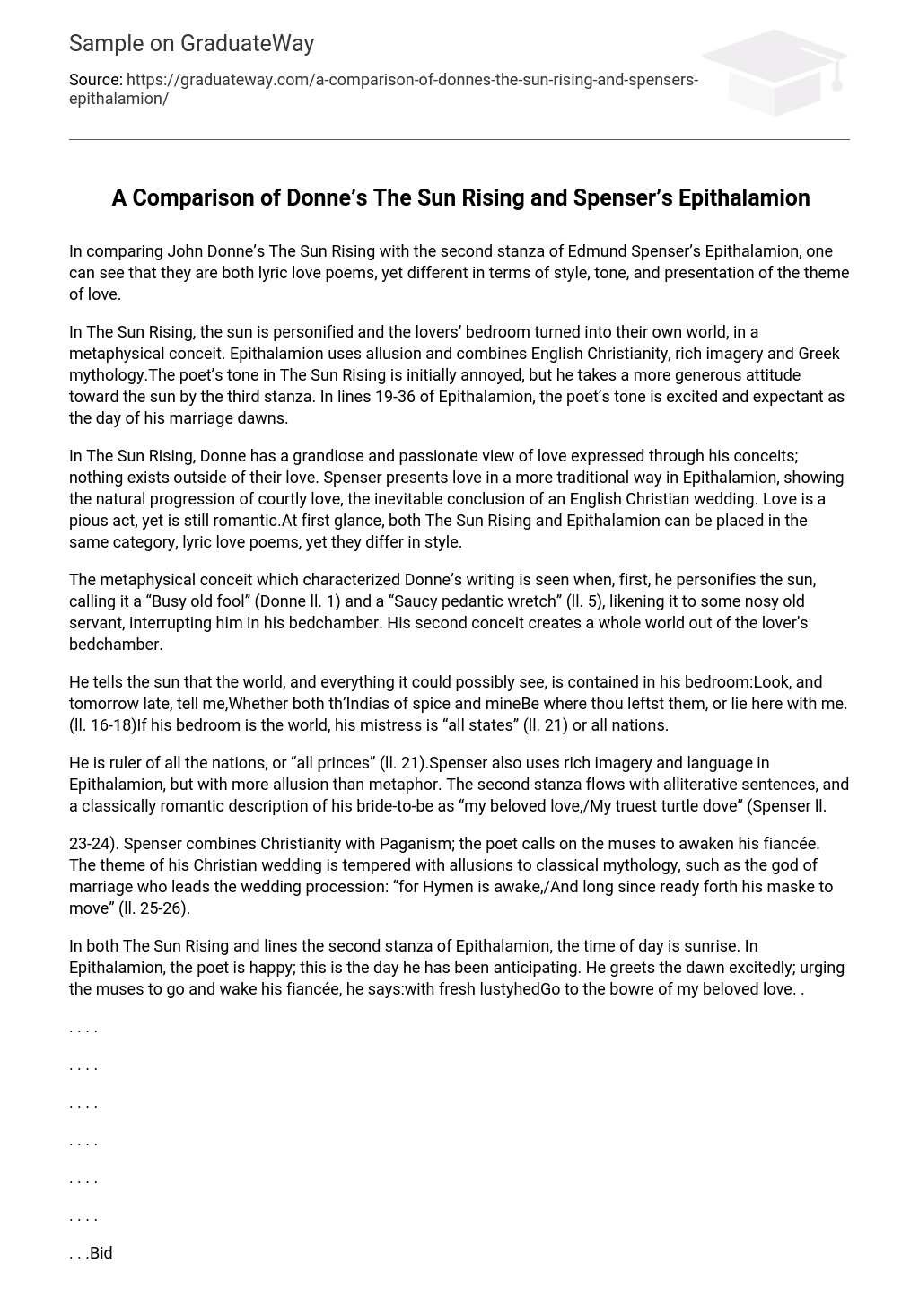In comparing John Donne’s The Sun Rising with the second stanza of Edmund Spenser’s Epithalamion, one can see that they are both lyric love poems, yet different in terms of style, tone, and presentation of the theme of love.
In The Sun Rising, the sun is personified and the lovers’ bedroom turned into their own world, in a metaphysical conceit. Epithalamion uses allusion and combines English Christianity, rich imagery and Greek mythology.The poet’s tone in The Sun Rising is initially annoyed, but he takes a more generous attitude toward the sun by the third stanza. In lines 19-36 of Epithalamion, the poet’s tone is excited and expectant as the day of his marriage dawns.
In The Sun Rising, Donne has a grandiose and passionate view of love expressed through his conceits; nothing exists outside of their love. Spenser presents love in a more traditional way in Epithalamion, showing the natural progression of courtly love, the inevitable conclusion of an English Christian wedding. Love is a pious act, yet is still romantic.At first glance, both The Sun Rising and Epithalamion can be placed in the same category, lyric love poems, yet they differ in style.
The metaphysical conceit which characterized Donne’s writing is seen when, first, he personifies the sun, calling it a “Busy old fool” (Donne ll. 1) and a “Saucy pedantic wretch” (ll. 5), likening it to some nosy old servant, interrupting him in his bedchamber. His second conceit creates a whole world out of the lover’s bedchamber.
He tells the sun that the world, and everything it could possibly see, is contained in his bedroom:Look, and tomorrow late, tell me,Whether both th’Indias of spice and mineBe where thou leftst them, or lie here with me. (ll. 16-18)If his bedroom is the world, his mistress is “all states” (ll. 21) or all nations.
He is ruler of all the nations, or “all princes” (ll. 21).Spenser also uses rich imagery and language in Epithalamion, but with more allusion than metaphor. The second stanza flows with alliterative sentences, and a classically romantic description of his bride-to-be as “my beloved love,/My truest turtle dove” (Spenser ll.
23-24). Spenser combines Christianity with Paganism; the poet calls on the muses to awaken his fiancée. The theme of his Christian wedding is tempered with allusions to classical mythology, such as the god of marriage who leads the wedding procession: “for Hymen is awake,/And long since ready forth his maske to move” (ll. 25-26).
In both The Sun Rising and lines the second stanza of Epithalamion, the time of day is sunrise. In Epithalamion, the poet is happy; this is the day he has been anticipating. He greets the dawn excitedly; urging the muses to go and wake his fiancée, he says:with fresh lustyhedGo to the bowre of my beloved love. .
. . . .
. . . .
. . . .
. . . .
. . . .
. . . .
. . .Bid her awake (ll.
22-26).The “wished day” (ll. 31) day has begun. In The Sun Rising, the poet’s voice holds an initial tone of annoyance.
He reprimands the sun for interrupting his lovemaking, telling it to go perform more commonplace duties:Braun 4go chideLate schoolboys and sour prentices,. . . .
. . . .
. . . .
. . . .
. . . .
. . . .
. . . .
. . . .
Call country ants to harvest offices;” (ll. 5-8)By the third stanza, the poet’s annoyance has subsided; in a blissful state, he is more generous with the sun, inviting it to stay and “shine here to us” (ll. 29).Donne expresses a grandiose view of love through his conceits in The Sun Rising.
The poet views himself as a god-like figure who can eclipse the sun “with a wink,” (Donne ll. 13) but will not because he does not want to lose sight of his mistress for a moment. Marriage is not mentioned, nor is it implied simply because the lovers are in bed together. Only passion rules them; they follow no season or time, as Donne states, “Love, all alike, no season knows nor clime/Nor hours, days, months,” (ll.
9-10). Their love is presented as a metaphor; it is the whole world, contained in their bedroom. In passionate terms, the poet asserts that nothing compares to it: “compared to this/All honor’s mimic, all wealth alchemy” (ll. 23-24).
Spenser’s presentation of love in Epithalamion is more traditional. The natural result of a traditional English courtship, marriage, is shown. The poet bids the muses to go to his wife and “Bid her awake therefore and soone her dight,” (Spenser ll. 30).
The importance of maintaining purity until marriage is shown by the betrothed maintaining separate bedrooms before the wedding. The poet says “Doe ye to her of joy and solace sing,” (ll. 35), showing his view of love is synonymous with joy; however it is still a pious and traditional concept. Epithalamion shows an orderly set of events taking place that must culminate in a Christian wedding before consummation can take place.
In conclusion, although The Sun Rising and Epithalamion are both love poems, they differ considerably in style, tone, and their presentation on the theme of love. The Sun Rising uses metaphysical conceits, whereas Epithalamion uses allusion and mixes Christianity with Paganism, rich language and imagery. The poet’s tone in The Sun Rising is one of annoyance at the sunrise which turns more generous by the end of the poem, and the poet in lines 19-36 of Epithalamion has the joyous and excited tone of a man on his wedding day. Finally, The Sun Rising presents the poet’s love not only as a grandiose and passionate metaphor, and the most important thing in the world.
The second stanza of Epithalamion presents a romantic yet more traditional concept of courtly love leading to marriage.





